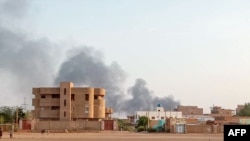Airstrikes pummeled Khartoum on Sunday and fighting raged in Sudan's western Darfur region, witnesses said, as a three-month war between the army and rival paramilitaries showed no signs of abating.
In the capital's east and northwest, army fighter jets "targeted bases" belonging to the paramilitary Rapid Support Forces (RSF) who "responded with anti-aircraft weapons," witnesses told AFP.
RSF drones targeted Khartoum's largest military hospital, according to witnesses. A similar attack Saturday on the same facility left five dead and 22 injured, the army said.
The war between army chief Abdel Fattah al-Burhan and his former deputy, RSF commander Mohamed Hamdan Daglo, has claimed at least 3,000 lives and displaced over 3 million people since it erupted on April 15.
In Darfur, a vast region which has seen some of the worst of the fighting, witnesses on Sunday reported "heavy clashes using various types of weapons" in the town of Kas.
Residents of Kas, about 80 kilometers (50 miles) northwest of the South Darfur state capital of Nyala, said houses were broken into and looted by RSF fighters.
The paramilitaries in a statement hailed their "victory" in the town.
Darfur, home to around a quarter of Sudan's 48 million people, has seen entire towns razed to the ground, with reports of mass civilian deaths and ethnically charged assassinations blamed on the RSF and allied Arab militias.
On Saturday, the RSF said it "categorically refutes" a recent report by Human Rights Watch that detailed the summary execution of "at least 28 ethnic Massalit" — a non-Arab minority group — and the "total destruction of the town of Misterei" in West Darfur state.
The RSF blamed the violence on "longstanding tribal conflict" and said it "strictly adheres" to "international humanitarian law."
The paramilitary force stemmed from the Janjaweed militia, which was armed and unleashed against ethnic minority rebels in Darfur in the early 2000s.
That conflict killed more than 300,000 people and displaced 2.5 million, the U.N. estimates.
Atrocities committed at the time led the International Criminal Court to charge former dictator Omar al-Bashir with offenses including genocide.
The court's chief prosecutor has launched a new investigation into suspected war crimes in the current fighting, including sexual violence and civilians being targeted for their ethnicity.




